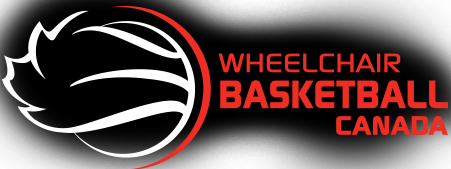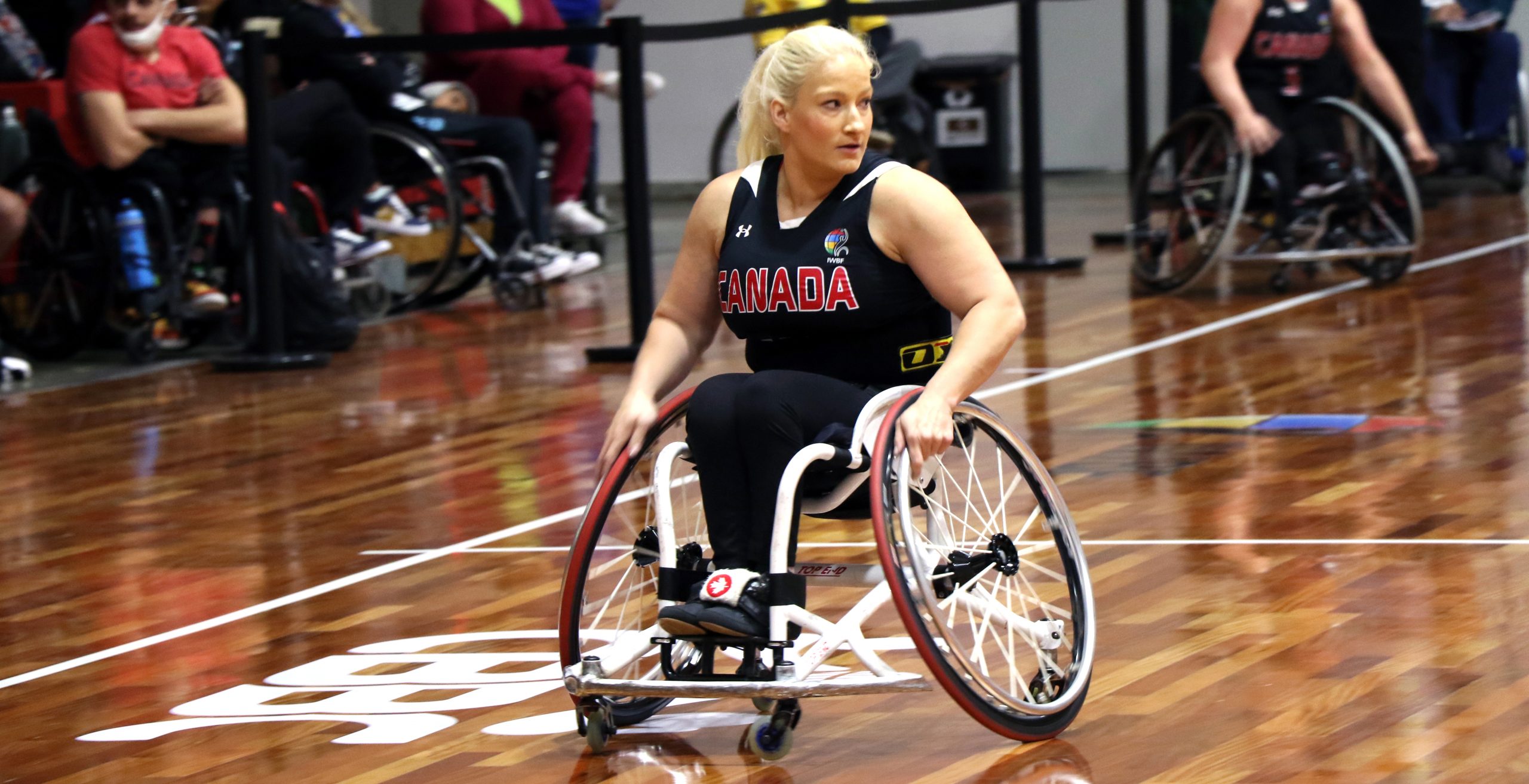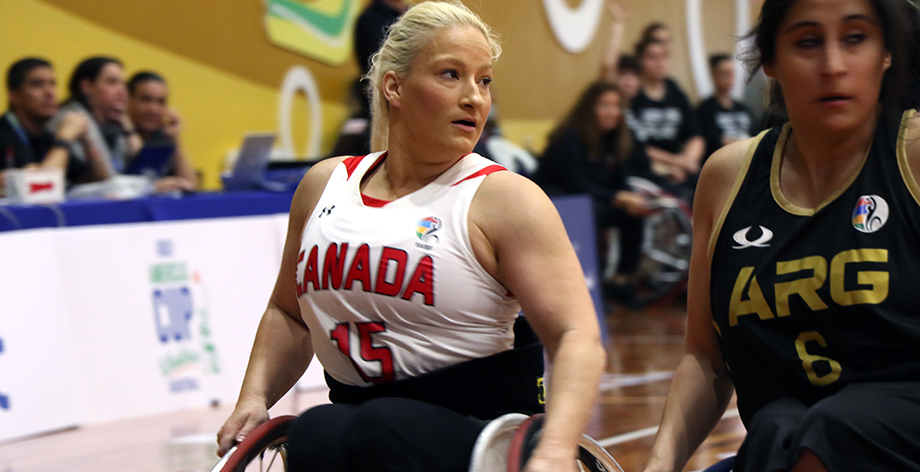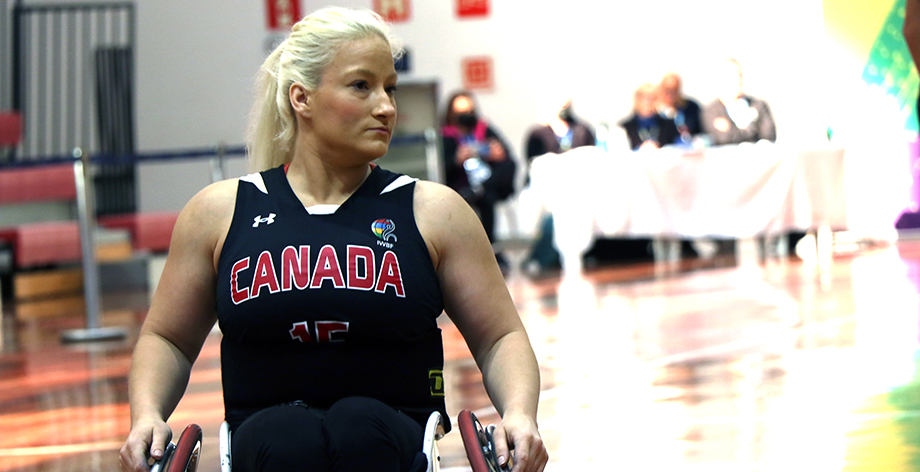Melanie writes about growing up in Oakville, her track career and finding wheelchair basketball in this month’s Athlete Spotlight presented by Toyota.
I had a typical childhood. I grew up with two older brothers. We all went to the same school—elementary and high school. I had amazing friends, had a great support system from my parents. I had a lot of fun.
I was born with spina bifida, hydrocephalus, so my spine grew outside of the sack on my spine, and the spinal cord didn’t grow and didn’t form properly. So at birth, they close the sack, and nerve damage is done to the spine.
My older brothers Danny and Dale were overprotective, but they also liked to play rough. I learned that I had to stand my ground at an early age. It was a typical older brother—younger sister dynamic. However, they were always supportive of my track career and now my basketball career.
We’re a big sports family. On my mom’s side, we have golf pros, so growing up with that sports background, my brothers were always in different sports. We are a very sporty family.
I started out doing track, swimming, and fields—I did shotput—I did those three for a while early on in my childhood. Eventually, as I got a little older, I had to choose which one I wanted to focus on, and that’s when I decided on track.
Introduction to track
Track was introduced to me by my mom’s good friend at her workplace. She introduced my mom to adaptive sports at the Golden Horseshoe Disabled Sports Association and said, ‘Hey, please bring your daughter out,’ and that’s when I first got introduced to track.
I was very disciplined with my track career from the age of five. I travelled all over the place by the time I was nine or 10-years-old. So early on in my life, I learned how to balance sport with everything else.
I love America, that’s my favourite place to travel to. That starts from travelling there at such a young age. I always went to Georgia or Florida for training camps, so I grew up loving the south. I really love their food, so I love typical southern foods.
I can’t think of just one highlight from my track career because it was it was all so much fun: from Junior Worlds and Canada Games, to the smaller events. I met so many different people, and that’s what I love about travel: I get to learn about different cultures. That’s my favourite part, so I cherish those moments in track—just meeting new people from other countries and getting to know where and how they live.
Finding wheelchair basketball
At the end of 2012, I had surgery. Because I was born with hydrocephalus, there was water on the brain collecting on the brain—they had to insert a tube to drain the cerebral spinal fluid properly. Unfortunately, that tube broke in three different spots, and I needed emergency surgery to have it replaced.
After that surgery, I had many complications, and getting back into training for track was very difficult. At the Golden Horseshoe Disabled Sports Association, they have basketball, and they said, ‘Come out and play, see if that affects you.’ This was while I was recovering from the surgery. I was always so active, and I wanted to just practice; I just wanted to do something, and keep moving.
So, the wheelchair basketball coach said, ‘Oh, come to our basketball practices.’ I went a few times, and I had no problems. I felt good. I kept going out casually and was invited to a tournament.
Chris Chandler was my basketball coach, and when he sees someone with potential, he will not give up on them. He wants them to succeed. He wants to see them achieve what he knows they can achieve. I give all the credit to Chris. When I was young, I was so stubborn. I was like, ‘No, I’m not I’m not playing basketball.’ I said ‘No’ for years, and he never gave up. Then finally, that opportunity came, and finally, I was like, ‘Okay, yes, I’ll practice,’ and that’s how I got into basketball.
My biggest hesitation about playing wheelchair basketball, in the beginning was I was a very shy person. Coming from track at such a young age, it’s an individual sport, it’s completely different. With track, I focused on myself. I couldn’t wrap my head around wheelchair basketball and having to connect with other people to make it work on the basketball court.
Looking back, it’s funny because that’s who I am. I love people. I want to help people. I want to work with people, so it’s fitting for me to be in wheelchair basketball. I just needed to jump into it. I just needed to do it, and then realize, ‘Okay, you know what? This is for me. I can thrive here. I can do this.’
The first year that I tried out with the Senior Women’s National Team was 2014. The previous year, I was carded as a development athlete. In 2014, that was a World Championship year, and I was never expecting to represent Canada on the world stage for World Championships, let alone two years later at a Paralympic Games.
Growing up, as a little girl, I always wanted to be a Paralympian. When you’re in class and write a little journal, ‘What do you want to do when you grow up?’ I wanted to be a Paralympian. That’s what I wanted. Did I ever think that was going to be in wheelchair basketball? Never in my wildest dreams did I think it would be with wheelchair basketball.
First Paralympic experience in Rio
When I think about going to Brazil and Rio for the Paralympics, I just look back at the process, from the beginning to how I got there. I’m so fortunate because we have the National Training Center, and at the time, we had the National Academy. I was one of first athletes to go to the academy and train under coach Mike Frogley. That experience alone has changed my whole life—not just in basketball, it’s more than basketball, it’s about who I am as a person now because of that experience.
Leading up to Rio, I really felt that with coach Frog’s support, I was able to make my debut at my Paralympic Games and feel confident that I was ready to go. It was an exciting journey to get there. For me, looking back at major games, it’s all about how I got there, it’s about the journey.
Experiencing the big Games, I just love looking at my teammates and seeing the looks on their faces and seeing through their eyes how they’re experiencing it. It brings so much happiness, and at the same time, it’s a crazy experience. It all happens so fast.
Playing professional wheelchair basketball
Playing in France for Metz last season was my first professional experience. It was so much fun. My teammates were absolutely amazing, and I couldn’t have asked for better, supportive teammates. They really made that experience what it was for me. I will always cherish that experience. I had such a fantastic experience, and people were kind to me. It made the experience that much better.
This season I’ll be playing in the north of Italy. I’m very excited about this opportunity. The citynwhere I’m playing is a beach town, a small town in Italy, so I’m just I’m very excited for that. It’s going to be a new experience, and I can’t wait to meet my new teammates.
Advice for new athletes
For me, the advice that I would give someone that wants to try wheelchair basketball is just to enjoy the experience. Don’t put pressure on yourself. Please enjoy learning and be a sponge; absorb what people are willing to teach you, but don’t take it too seriously.





